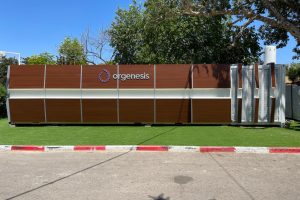
Johns Hopkins Medicine and biotech company Orgenesis are collaborating on the Maryland Center for Cell Therapy Manufacturing, which will allow Johns Hopkins researchers a more streamlined path to take promising treatments from the lab to patient trials.
The state-of-the-art facility will be located in the Rangos Building on Johns Hopkins’ East Baltimore medical campus. It will be built to meet industry standards to develop and manufacture clinical biologic products (cell- and gene-modified cell therapy products) as part of the point-of-care model to deliver innovative therapeutics to patients being treated at Johns Hopkins. This approach, combined with the expertise of Orgenesis, has the potential to accelerate the process of moving promising new therapies developed by Johns Hopkins Medicine investigators to the treatment clinics, according to Victor Lemas, director of the cell therapy laboratory at Johns Hopkins Medicine.
“We have a lot of investigators who are very interested in developing and manufacturing their novel therapies, and this new space will provide us with the equipment and expertise to meet their needs,” says Lemas. “Having Orgenesis on campus provides an opportunity for the investigator to closely collaborate with the Orgenesis experts to accurately translate cell therapy innovations from the laboratories to the patient clinics.”
In October 2021, the state of Maryland approved a $5 million matching grant from The Johns Hopkins University for the project, and construction of the 7,000-square-foot facility is scheduled to begin this spring. Johns Hopkins Technology Ventures (JHTV) has been working on the collaboration with Orgenesis for several years, after an introduction to the company by the Maryland Technology Development Corporation.
Since those initial conversations, a cell therapy manufacturing working group at Johns Hopkins met weekly to keep the project moving, said Helen Montag, JHTV’s senior director for ecosystem development, who worked closely with Orgenesis on the collaboration. Montag credits William Nelson, director of the Johns Hopkins Kimmel Cancer Center, for encouraging a focus on cell therapy; Elizabeth Jaffee, deputy director of the Kimmel Cancer Center, for championing the project among faculty; and Landon King, executive vice dean of the Johns Hopkins University School of Medicine, for supporting the effort.
“We hope the new center means that pharma will want to work more closely with us, knowing that our efforts will be further along than ever before thanks to input from the Orgenesis team,” Montag says.
Orgenesis specializes in developing cell and gene therapies for point-of-care use. The company was founded in Israel and has facilities around the world. It is headquartered in Germantown, Maryland. CEO Vered Caplan anticipates having 30 employees initially working out of the Johns Hopkins facility when it opens. Orgenesis already is using lab space at FastForward, JHTV’s innovation hub, as part of the collaboration.
“Through working with Johns Hopkins, we are able to bring our expertise in producing these therapies at scale directly to some of the top researchers and clinicians in the world, as well as provide the capacity for supplying products for additional clinical research,” Caplan says. “We believe this collaboration will accelerate our goal of making these therapies accessible to all.”
Cell and gene therapies employ modified cells or selectively expanded types of therapeutic cells to treat, prevent or cure serious health problems such as cancer, genetic disorders, immune deficiencies and rare diseases. Such work is being performed throughout Johns Hopkins, Lemas says, for different types of blood cancers as well as various regenerative medicine applications, such as repairing and rebuilding the cardiac muscle and expanding specific skin cells to treat patients who have limb sensitivities after amputation so they can wear prosthetics.
“We think of Orgenesis as a connection to high-level, innovative technology and expertise that can drive the manufacturing development of these biologic products here at Johns Hopkins,” says Lemas, who led a team from Johns Hopkins that toured an Orgenesis cell therapy manufacturing unit in Belgium. “Opening this new facility is the next step in the evolution of the way we bring the most advanced cell therapies to our patients at Johns Hopkins.”